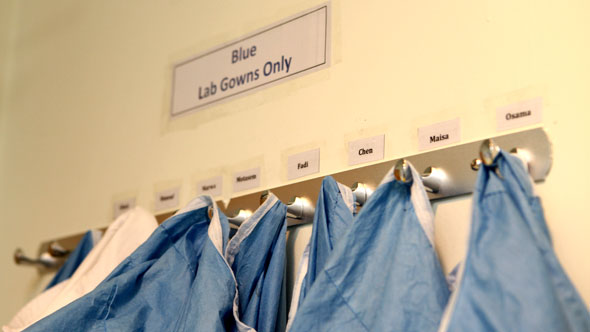Kuwaiti Health-Care Sector: Current Trends
It has become common knowledge that basic health-care is provided free to Kuwaiti citizens. With a total population of 3.5 million people, of which a third are Kuwaiti nationals, the oil-rich Dawlat al-Kuwait, the State of Kuwait, had so far few problems paying for doctor visits.

Kuwaiti Health-Care Sector: Current Trends in Kuwaiti Health-care
It has become common knowledge that basic health-care in Kuwait is provided free to Kuwaiti citizens. With a total population of 3.5 million people, of which a third are Kuwaiti nationals, the oil-rich Dawlat al-Kuwait, the State of Kuwait, had so far few problems paying for doctor visits.
“Unfortunately, [Kuwait is] number 3 according to the IDF (International Diabetes Foundation) which was announced in December 2011.”
“In our constitution, public health-care is Article 15, which provides the facilities for the population living in the country. Basically, it is free,” said Dr. Dr. Kazem Behbehani, Director General of the Dasman Diabetes Institute in Kuwait City.
“The health-care services in Kuwait are predominately public service provided,” Yousif Abou Zahr, CEO of Al Seef Hospital, told Marcopolis. “The public sector is the largest in the provision of health-care in Kuwait. It constitutes 90 percent of the market in the number of beds and in services.”
The public and private sectors have developed different focuses over the years, Abou Zahr explained: “The public sector still dominates the market and it is providing the primary, secondary, and tertiary services, whereas the private sector is focusing on primary and secondary services.”
Primary Health-care or PHC is the basic medical supply which is widely accessible for all social levels. All treatments and services done by a specialist, such as a neurosurgeon, fall under the term secondary health-care, while tertiary health-care deals with consultation delivered by specialists and referral from primary and secondary.
According to Dr. Tareq Al Mukhaizeem, Chairman and Managing Director of Al Salam Hospital, “There is a statistic that states that about 20% of the population does not need health-care, which is the young segment of the population; they only need secondary and tertiary health-care in hospitals, while 60% need primary health-care.”
Due to the wealth in the tax-free sheikhdom, many citizens, locals, and foreigners likewise, are not insured. “You have almost 60 percent of the population that are cash payers, while 40 percent are covered by health insurance companies and are governed by corporate accounts through large institutes,” Abou Zahr explains.
Foreign hospitals, which are a very commonly seen in Dubai and in Qatar, are rare in Kuwait. Mrs. Margaret Al-Sayer, Founding Director of the Bayt Abdulla Children’s Hospice, explains the reasons for establishment of this center: “Bayt Abdullah Children’s Hospice was designed to accommodate the needs of children with life-limiting and life-threatening conditions and their families in Kuwait. The hospice building itself is part of a continuum of care that offers children and their families the maximum freedom of choice without compromising the quality of that care, whether at home in hospital or within the hospice itself.” The Hospice’s goal is to be a ‘home away from home’.

As in all Gulf Arab states, the number of patients who suffer from Diabetes is rising. The feel-good factor in the wealthy state of Kuwait, along with social and general job security takes its toll. According to Diabetes-expert Dr. Behbehani, “47% of the population is obese, unfortunately. With obesity alone, you can lose up to 9 years of your life. With both diabetes and obesity, you can lose 15 years of your life.”
The high share of obese people propelled Kuwait to one of top countries in diabetes ranking worldwide. “Unfortunately, we are number 3 according to the IDF (International Diabetes Foundation) which was announced in December 2011.”
Dr. Behbahani talks with Marcopolis about the reasons for the epidemic-like spread of Diabetes:
“Unfortunately in recent years, not only in Kuwait but in many other countries around the world, Type II Diabetes from adult onset (elderly) has come down to the younger age group. This more or less relates to (apart from the genetic part of it) it really relates to the lifestyle and the amount of food you eat and type of food you eat and the exercise you don’t do and the sweets you have.”
Medicines distinguish between two types of diabetes: “There is Type I and Type II diabetes. Apart from Type I Diabetes, where you really need insulin from the beginning of your life, Type II is the adult onset and it is later on in your life that you will have it.”
Dr. Behbahani’s Institute Dasman not only delivers cures for patients, but also does research and supports campaign to prevent people from becoming obese and subsequently diagnosed as diabetics.
“We have a walking track, swimming pool, and exercise place to show them how to change their lifestyle. We even also have a cooking class to exemplify healthy cooking. We have a lot of training for the public whether they are diabetic or not because it is an individual’s responsibility to take care of their health … and we have 50 research projects on which we work.”
What are the challenges in the health-care system? Dr. Al Mukhaizeem, Chairman and Managing Director of the Al Salam Hospital says that “there should be an insurance scheme to cut the costs of health-care for citizens and foreigners.”
Mrs. Al-Sayer has a very specific mission in mind: “We want to develop Bayt Abdullah, named after the little boy we looked after in 1989, as a center of excellence in pediatric palliative care in Kuwait. We need to have the involvement of experts in this field here in Kuwait, we need people to come out to this part of the world for six months, for a year, for two years, so that they can inspire our younger doctors.” Kuwait is open to talent to provide state-of-the-art health-care.